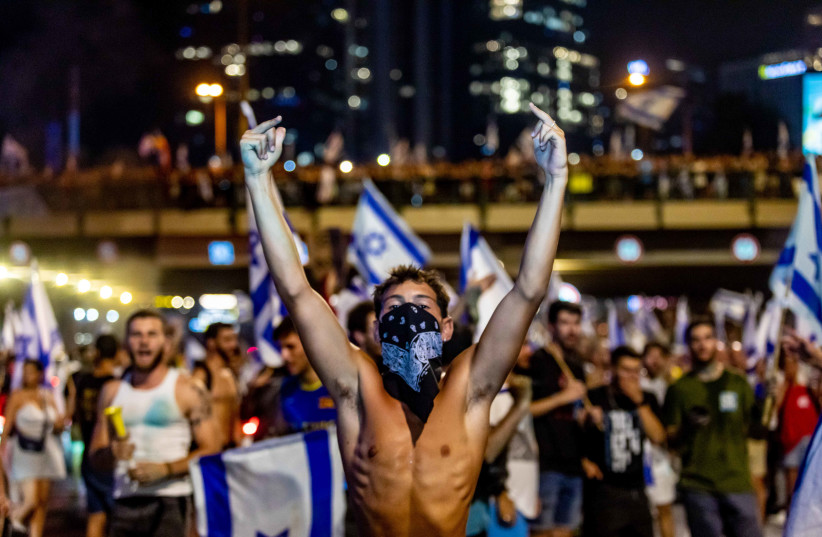The crisis sweeping Israel has become a focal point for its enemies across the Middle East who have convened top-level meetings to weigh the turmoil and how they might capitalize on it, sources familiar with the discussions say.
Foes including Lebanon's Iran-backed Hezbollah have been crowing at the sight of Israel fractured by the crisis ignited by government moves to overhaul the judiciary, especially threats by reservists to stop showing up for military service.
Away from the propaganda being broadcast by groups eager to see Israel's demise, these factions have also been devoting special attention to the crisis at closed-door meetings, perceiving this as a potential turning point for Israel.
The subject was discussed at a three-hour meeting last week involving a senior commander from Iran's Quds Force, the arm of its Revolutionary Guards that funnels military support to Tehran's allies, two Iranian security officials and officials from Palestinian Islamist group Hamas, an Iranian diplomat said.
After concluding that the crisis had already weakened Israel, they agreed they should refrain from any "direct interference," believing this could give Prime Minister Benjamin Netanyahu the chance to shift blame to foreign adversaries.

A Hamas source declined to comment on the account, saying there are ongoing discussions between Hamas, Iran and the Quds Force "over the whole situation and to discuss ways to upgrade the work of resistance."
Iran's foreign ministry and the Guards' public relations office could not be immediately reached for comment.
Hezbollah and Hamas find opportunity in crisis
The upheaval marks one of the most serious domestic crises since Israel was established in 1948, ushering in decades of conflict with Arab countries and Palestinians who want to establish a state in territory occupied by Israel.
Israel's parliament on Monday ratified a first bill of the judicial reform, limiting the powers of the country's Supreme Court, prompting more protests by Israelis who see the moves as a menace to their democracy.
The divisions have seeped into the Israeli military, which has fought numerous conflicts with Lebanon's Hezbollah and the Palestinian factions Hamas and Palestinian Islamic Jihad, both backed by Iran.
Israeli protest leaders have said thousands of volunteer reservists could abstain from duty if the government stays the course, and former senior military officials have warned that Israel's war-readiness could be at risk.
A video shared on social media on Tuesday showed elite fighters from Hezbollah mounting a rare patrol directly at the fenced Lebanese border with Israel, according to a Lebanese source familiar with the deployment.
The source said the patrol along the rugged frontier, where tensions have been running high of late, had nothing to do with events in Israel. Hezbollah's media office declined to comment.
The source said however that Hezbollah officials have discussed the crisis in detail at the highest levels. The group views the crisis as a development to be exploited in the future, the source added.
Israeli Finance Minister Bezalel Smotrich said on Tuesday the Israeli military "is combat-ready and will remain combat-ready" despite the protesting reservists, whom he accused of trying to "put a gun to the head of the government."
Hezbollah leader Sayyed Hassan Nasrallah, in a speech on Monday, said Israel was on a "path of collapse and fragmentation."
Iranian Foreign Ministry spokesperson Nasser Kanaani referred to Netanyahu's recently fitted pacemaker when tweeting about the crisis, saying "the heart of the Zionist regime is in deeper crisis than the crisis in the heart of its prime minister."
The crisis has come at a time of surging violence between Israel and the Palestinians, particularly in the West Bank, where Israeli troops killed three terrorists who opened fire on them from a car on Tuesday.
Hamas identified them as its members.
Sources close to Hamas and Palestinian Islamic Jihad say the two groups are monitoring closely the protests in Israel, enjoying the images, and hoping the tensions worsen.
But they are also wary of the risk of Netanyahu seeking to divert attention from the domestic crisis through conflict against Israel's enemies that could unite its people.
“They are following it seriously to assess how this could reflect on them and whether Israel could export its internal crisis,” Gaza political analyst Adnan Abu Amer said.
